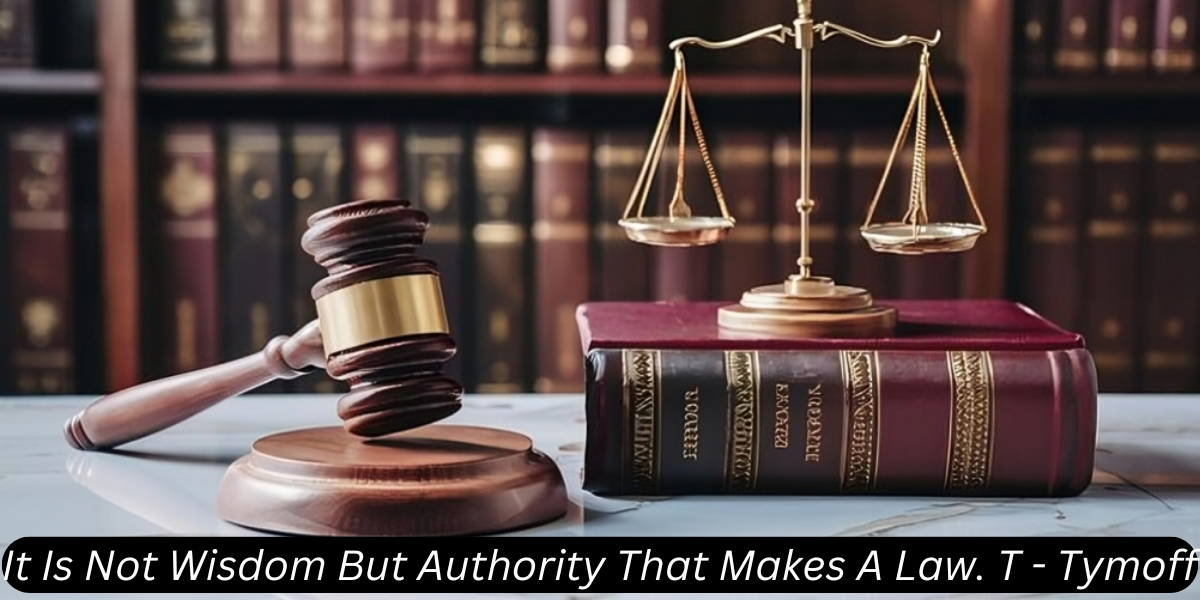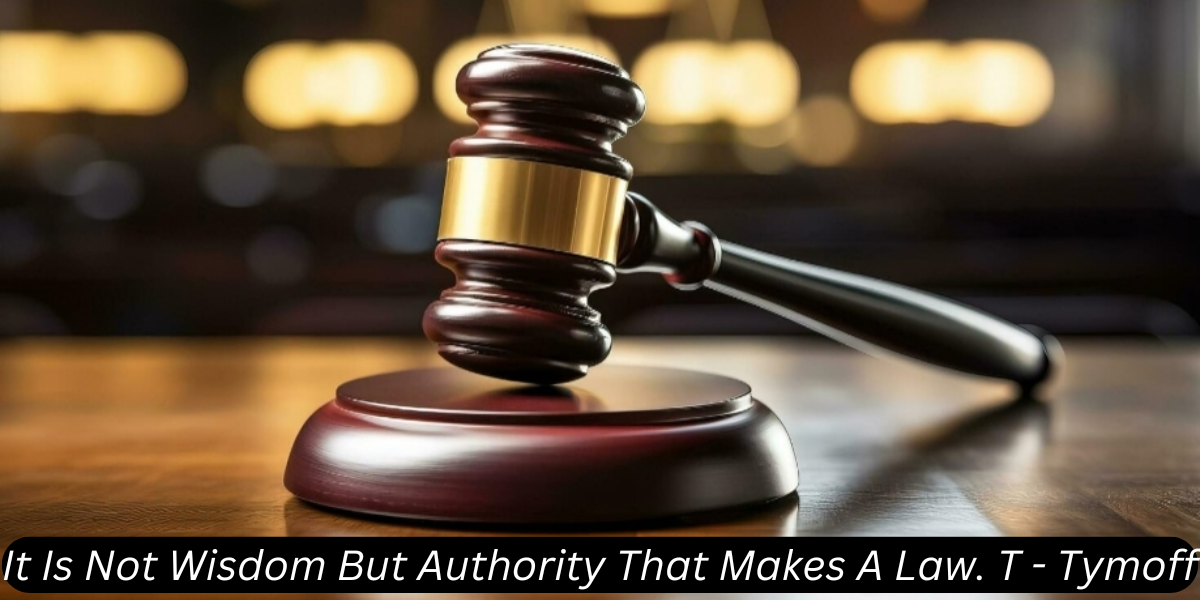
The saying it is not wisdom but authority that makes a law. t – tymoff highlights a fundamental truth about how laws are established and enforced in society. This statement, attributed to T. Tymoff, encourages us to examine the relationship between authority and law-making. While wisdom may guide our understanding of what is right or just, it is ultimately authority that gives laws their power. In this article, we will explore the meaning of this phrase, its implications for society, and how authority shapes the laws that govern us.
Understanding the Concept of Authority
What is Authority?
Authority refers to the power or right to give orders, make decisions, and enforce obedience. It can take various forms, including political, legal, and social authority. In the context of law, authority is what legitimizes a law and compels individuals to adhere to it. Without authority, laws may exist but lack the means to be effectively enforced or followed.
Types of Authority
- Legitimate Authority: This is recognized and accepted by the governed. It often arises from formal institutions, such as governments or courts.
- Illegitimate Authority: Authority that is not recognized or accepted by the people. This can lead to resistance or rebellion against the imposed laws.
- Expert Authority: This is derived from knowledge and expertise in a specific field. For example, legal experts may influence the creation of laws based on their understanding of justice and fairness.
- Charismatic Authority: This arises from the personal appeal or extraordinary qualities of an individual. Leaders who possess charisma can inspire loyalty and adherence to laws simply through their influence.
The Role of Authority in Law-Making
Laws are established by those in positions of authority, whether they are legislators, judges, or other officials. This process often involves:
- Drafting Legislation: Authority figures propose laws based on societal needs, values, and norms.
- Debate and Approval: Laws are debated, amended, and approved through established legislative processes.
- Enforcement: Once enacted, authorities, such as law enforcement agencies, are responsible for enforcing the laws.
The Limits of Authority
While authority is essential for creating and enforcing laws, it is not infallible. Laws can be unjust, discriminatory, or harmful. It is crucial to examine whether the authority establishing the law is acting in the public’s best interest. When authority is abused, it can lead to the enactment of laws that may not reflect the wisdom or needs of the society they govern.
The Relationship Between Wisdom and Law
What is Wisdom?
Wisdom encompasses knowledge, experience, and good judgment. It involves understanding the complexities of human behavior and societal needs. While authority establishes laws, wisdom helps guide the creation of fair and just laws.
The Need for Wisdom in Law-Making
- Informed Decision-Making: Wisdom allows lawmakers to make decisions based on empirical evidence and ethical considerations.
- Promoting Justice: A wise approach to law-making considers the broader implications of a law, striving for justice and equity.
- Adaptability: Laws must evolve with society. Wisdom enables lawmakers to recognize when a law is outdated or harmful.
The Tension Between Authority and Wisdom
Often, there is a tension between authority and wisdom. Authorities may enact laws based on political expediency or pressure, sidelining wisdom. This dynamic raises questions about the integrity of the legal system and its ability to serve justice.
Historical Perspectives on Authority and Law
Ancient Civilizations
Throughout history, authority has shaped laws. In ancient civilizations, rulers claimed divine authority to enact laws. For example, in Babylon, Hammurabi’s Code exemplified how authority was used to create a comprehensive legal framework, emphasizing the ruler’s power.
The Enlightenment Era
The Enlightenment brought a shift in thinking about authority and law. Philosophers like John Locke and Montesquieu emphasized the importance of reason and wisdom in governance. They advocated for laws based on rationality rather than sheer authority, laying the groundwork for modern democratic principles.
Modern Legal Systems
Today, many legal systems incorporate checks and balances to ensure that authority does not override wisdom. Democratic principles, such as separation of powers and judicial review, are designed to prevent the abuse of authority and promote fair law-making.
The Importance of Rule of Law
Defining Rule of Law
The rule of law is a fundamental principle that suggests that laws should govern a nation, as opposed to arbitrary decisions by individual government officials. This principle emphasizes that everyone, including those in power, is subject to the law.
Authority vs. Rule of Law
While authority establishes laws, the rule of law ensures that those laws are applied fairly and consistently. It requires that:
- Laws are clear, publicized, and stable.
- The processes by which laws are enacted, administered, and enforced are accessible, fair, and efficient.
- Justice is delivered timely by competent, ethical, and independent representatives.
Why Rule of Law Matters
- Prevents Abuse of Power: By limiting the authority of any one individual or institution, the rule of law protects citizens from tyranny.
- Promotes Justice and Equality: When laws apply equally to all individuals, it fosters a sense of fairness and trust in the legal system.
- Encourages Social Order: A society governed by the rule of law is generally more stable and prosperous, as individuals can rely on legal protections.
Case Studies: When Authority Overrides Wisdom

Historical Examples
- Jim Crow Laws: In the United States, laws enforcing racial segregation were established under the authority of state governments. These laws were unjust and discriminatory, demonstrating a failure of wisdom in the legal system.
- Nazi Germany: The regime enacted laws that dehumanized certain groups based on race and religion. Despite having the authority to create these laws, the wisdom to protect human rights was absent.
Contemporary Issues
- Voter ID Laws: Some states have enacted laws requiring identification to vote. Critics argue that these laws disproportionately affect marginalized communities, raising questions about the wisdom behind such authority.
- Drug Policies: Many countries maintain strict drug laws that have been criticized for their harsh penalties and negative societal impact. The authority to enforce these laws often overlooks the need for more humane and effective approaches.
Striving for a Balance Between Authority and Wisdom
Encouraging Informed Law-Making
To achieve a balance between authority and wisdom, it is essential to promote informed law-making. This can be accomplished through:
- Public Participation: Engaging citizens in the law-making process helps ensure that diverse perspectives are considered. Public hearings and consultations can be effective ways to gather input.
- Data-Driven Policies: Lawmakers should rely on empirical data and research to guide their decisions, ensuring that laws address actual societal needs.
- Ethical Considerations: Incorporating ethics into the legislative process encourages lawmakers to consider the broader implications of their decisions.
The Role of Education
Education plays a vital role in bridging the gap between authority and wisdom. By fostering critical thinking and ethical reasoning, education can empower future leaders to make laws that reflect both authority and wisdom.
- Civic Education: Teaching citizens about their rights and responsibilities promotes active participation in governance, reinforcing the importance of the rule of law.
- Legal Education: Law schools should emphasize the interplay between authority and wisdom, preparing future lawyers and judges to navigate complex legal landscapes.
For More Information Visit: Peace Magazines
Conclusion
The statement “It is not wisdom but authority that makes a law” serves as a poignant reminder of the relationship between power and governance. While authority is necessary for creating and enforcing laws, wisdom is equally essential to ensure that these laws serve justice and the common good. As society continues to evolve, it is crucial to strive for a legal system that balances authority with wisdom, promoting fairness, equality, and justice for all.
In conclusion, understanding the dynamics of authority and wisdom in law-making allows us to critically assess the laws that govern our lives. By advocating for informed, ethical, and participatory law-making processes, we can create a legal framework that not only commands respect but also embodies the principles of justice and humanity.
FAQs
-
What does the phrase “It is not wisdom but authority that makes a law” mean?
- This phrase emphasizes that laws are established and enforced by those in positions of power, rather than being inherently wise or just.
-
How does authority influence law-making?
- Authority allows individuals or institutions to create, implement, and enforce laws, giving them legitimacy and power within society.
-
What is the difference between legitimate and illegitimate authority in law?
- Legitimate authority is recognized and accepted by society, while illegitimate authority lacks public support and can lead to resistance or rebellion.
-
Why is wisdom important in the law-making process?
- Wisdom ensures that laws are fair, just, and reflect the needs of society, guiding lawmakers to make informed decisions.
-
What is the rule of law, and why does it matter?
- The rule of law means that laws govern a nation, protecting individuals from arbitrary authority and ensuring justice is applied consistently.
-
Can authority lead to unjust laws?
- Yes, authority can enact laws that are unjust or discriminatory, especially when the decision-makers disregard ethical considerations and public input.
-
How can citizens participate in the law-making process?
- Citizens can engage through public hearings, consultations, and advocacy, ensuring diverse perspectives are considered in legislative decisions.
-
What role does education play in balancing authority and wisdom?
- Education fosters critical thinking and ethical reasoning, empowering future leaders and citizens to advocate for laws that promote justice and equity.







